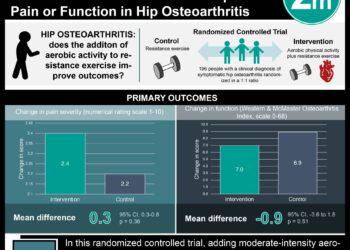MIV-711 effective in reducing bone and cartilage manifestations for patients with osteoarthritis
1. In this double-blind phase 2a trial, cathepsin K inhibitor MIV-711 did not show a significant benefit in reducing pain but proved effective in delaying structural changes associated with progression of osteoarthritis.
2. Biomarkers of bone resorption were significantly reduced in both treatment groups but returned to baseline levels after treatment stopped at the end of the study.
Evidence level: 1 (Excellent)
Study Rundown: Cathepsin K is a cysteine endopeptidase with the ability to degrade bone and cartilage through catabolism of essential matrix proteins including elastin, collagen, and gelatin. Progression of osteoarthritis is marked by such structural changes, but the effects of cathepsin K inhibition with relation to this condition are yet unknown. MIV-711 is a selective, reversible inhibitor that has substantially reduced biomarkers of bone resorption and cartilage loss in preclinical modeling and clinical testing. This study aimed to determine the efficacy, safety, and tolerability of MIV-711 in patients with symptomatic osteoarthritis, finding that while there was no significant difference versus placebo in patient-reported pain, function, and stiffness, patients in the treatment groups experienced significant reductions in cartilage thinning, bone area progression, and relevant biomarkers. Withdrawal of MIV-711 at the end of the study was associated with a noticeable rebound effect, supporting effective target engagement of the bone-acting agent. Adverse events occurred at similar rates across groups, and no serious adverse events were considered to be treatment-related. Patient adherence was high, but this study was limited by a short time frame that may have precluded the translation of disease-modifying effects to alleviation of symptoms.
Click here to read the study in Annals of Internal Medicine
Click here to read an accompanying editorial in Annals of Internal Medicine
Relevant Reading: Cathepsin K Inhibitors for Osteoporosis: Biology, Potential Clinical Utility, and Lessons Learned.
In-Depth [randomized controlled trial]: In this 26-week, double-blind, multicenter phase 2a trial, 244 patients in Europe aged 40 to 80 years with primary knee osteoarthritis were randomly assigned in a 1:1:1 ratio to receive 100 mg MIV-711, 200 mg MIV-711, or placebo once daily. Exclusion criteria were inflammatory arthritis, corticosteroid use, hyaluronic acid use, significant injury, surgery, and joint replacement. The primary outcome of average pain severity decreased in all treatment groups according to change in numerical rating scale (NRS) score, but no statistically significant difference in least-squares means was found (-1.4 [95% CI, 1.9 to 0.8] for placebo; 1.7 [CI, 2.3 to 1.2] for MIV-711, 100 mg/d; and 1.5 [CI, 2.0 to 0.9] for MIV-711, 200 mg/d). Conversely, bone area on MRI increased in all groups, but the estimated mean changes were significantly smaller in the two treatment groups (23.3 sq. mm [CI, 15.7 to 30.9 sq. mm] for placebo; 7.9 sq. mm [CI, 0.5 to 15.3 sq. mm] for MIV-711, 100 mg/d; and 8.6 sq. mm [CI, 1.1 to 16.1 sq. mm] for MIV-711, 200 mg/d). Levels of types I and II collagen C-telopeptide were reduced by 27.8% and 34.4%, respectively, with 100 mg/d MIV-711 and by 50.3% and 51.6% with 200 mg/d MIV-711, but returned to baseline levels after cessation of treatment (P<.001 for all).
Image: PD
©2019 2 Minute Medicine, Inc. All rights reserved. No works may be reproduced without expressed written consent from 2 Minute Medicine, Inc. Inquire about licensing here. No article should be construed as medical advice and is not intended as such by the authors or by 2 Minute Medicine, Inc.







